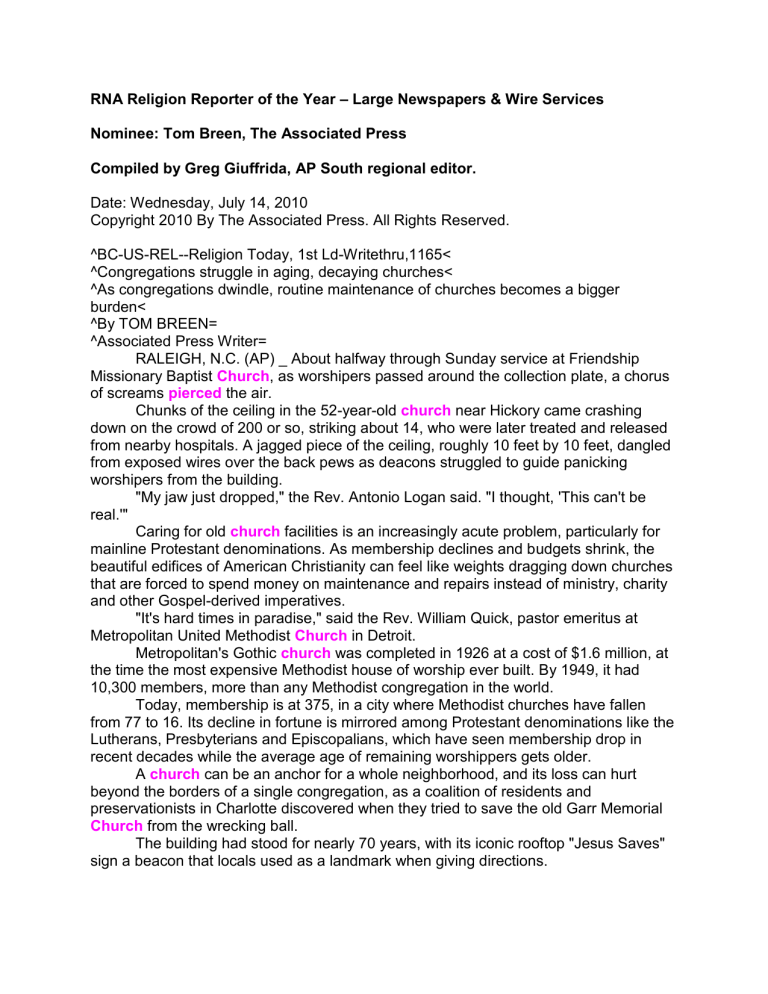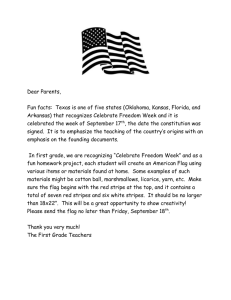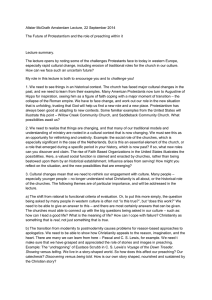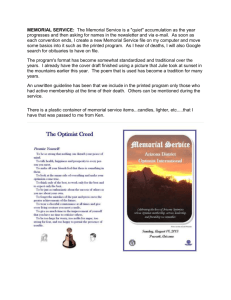RNA Religion Reporter of the Year – Large Newspapers & Wire

RNA Religion Reporter of the Year
– Large Newspapers & Wire Services
Nominee: Tom Breen, The Associated Press
Compiled by Greg Giuffrida, AP South regional editor.
Date: Wednesday, July 14, 2010
Copyright 2010 By The Associated Press. All Rights Reserved.
^BC-US-REL--Religion Today, 1st Ld-Writethru,1165<
^Congregations struggle in aging, decaying churches<
^As congregations dwindle, routine maintenance of churches becomes a bigger burden<
^By TOM BREEN=
^Associated Press Writer=
RALEIGH, N.C. (AP) _ About halfway through Sunday service at Friendship
Missionary Baptist Church , as worshipers passed around the collection plate, a chorus of screams pierced the air.
Chunks of the ceiling in the 52-year-old church near Hickory came crashing down on the crowd of 200 or so, striking about 14, who were later treated and released from nearby hospitals. A jagged piece of the ceiling, roughly 10 feet by 10 feet, dangled from exposed wires over the back pews as deacons struggled to guide panicking worshipers from the building.
"My jaw just dropped," the Rev. Antonio Logan said. "I thought, 'This can't be real.'"
Caring for old church facilities is an increasingly acute problem, particularly for mainline Protestant denominations. As membership declines and budgets shrink, the beautiful edifices of American Christianity can feel like weights dragging down churches that are forced to spend money on maintenance and repairs instead of ministry, charity and other Gospel-derived imperatives.
"It's hard times in paradise," said the Rev. William Quick, pastor emeritus at
Metropolitan United Methodist Church in Detroit.
Metropolitan's Gothic church was completed in 1926 at a cost of $1.6 million, at the time the most expensive Methodist house of worship ever built. By 1949, it had
10,300 members, more than any Methodist congregation in the world.
Today, membership is at 375, in a city where Methodist churches have fallen from 77 to 16. Its decline in fortune is mirrored among Protestant denominations like the
Lutherans, Presbyterians and Episcopalians, which have seen membership drop in recent decades while the average age of remaining worshippers gets older.
A church can be an anchor for a whole neighborhood, and its loss can hurt beyond the borders of a single congregation, as a coalition of residents and preservationists in Charlotte discovered when they tried to save the old Garr Memorial
Church from the wrecking ball.
The building had stood for nearly 70 years, with its iconic rooftop "Jesus Saves" sign a beacon that locals used as a landmark when giving directions.
On a Wednesday in July, the old building came down after its new owners, the
New Bethel Church of God in Christ, couldn't justify refurbishing the building.
"It's regretful, but the economics, just the roof repair cost was just excessive," said Bobby Drakeford, a real estate developer and consultant for New Bethel.
New Bethel plans to develop the property, but for churches that try to stay in their old buildings, even necessary upkeep can become a burden.
The Rev. Phyllis Norman is the pastor of Prospect Congregational Church in
Prospect, Conn., which is planning to add an elevator to its 59-year-old building.
Churches are exempt from federal regulations requiring buildings to be accessible to people with disabilities, but many congregations with aging members are installing wheelchair ramps, elevators and other features.
Before that effort had really taken off, though, the Connecticut church 's decadesold septic system failed, dumping a $30,000 repair bill in the congregation's lap.
"The timing was just pathetic," she said.
Making things harder is that many pastors are loathe to set aside money for maintenance that could be used on missionary work or charitable services like soup kitchens, said the Rev. Ken Carder, a retired Methodist bishop and professor at the
Duke Divinity School.
"I was the same way about endowments when I started out. You know, 'Lay not up for yourselves treasure upon the earth, where moth and rust corrupt,'" he said, quoting the Gospel of Matthew.
But setting aside money for maintenance costs will enable future generations to pursue those ministries by freeing them from the burden of emergency repairs, Carder said.
A reluctance to spend money on upkeep has caught the attention of churches' insurers, who are making more maintenance recommendations since the start of the
Great Recession, according to Rick Schaber, risk control manager for Church Mutual
Insurance, a Wisconsin-based company that insures more than 100,000 religious institutions in the U.S.
"We're finding some things are starting to get a little bit worse," he said. "If our customers are forced to make cuts, we're finding that maintenance budgets are commonly the first place they look."
Norman's congregation, like many, does not want to reduce its commitment to efforts like the local food pantry and soup kitchen, it's getting creative: The church is seeking a tax status that would let them apply for grants to fund the elevator and is considering a loan from a United Church of Christ fund specifically designed for building needs.
The UCC's Cornerstone Fund typically has 200 or so low-interest loans outstanding at any given time, ranging anywhere from $15,000 to $3 million, according to Mary Seymour, vice president of the fund. Seymour has seen the number of loans rise as churches fund more emergency repairs.
"Many of our churches are 150 years old or older, and many others were built in the 1950s, when no one gave a thought to handicap accessibility," she said.
Most mainline denominations have similar funds, partly because local congregations can't pay for work they might have been able to afford in the past.
"A lot of these churches have shrunk from 500 members to 100 members, or from 800 members to 200 members," said Robert Jaeger, executive director of the
Partnership for Sacred Places. "They look at the trend lines and they see the decline in membership and wonder, 'Gosh, in 10 or 15 years are we going to be gone?'"
Jaeger's group strives to prevent that, primarily through an intensive, yearlong training with smaller churches designed to show them how they can find new ways to pay for repairs and maintenance.
The partnership's main theme comes from research it conducted showing that roughly 80 percent of the people who use church facilities for things like after-school programs or Alcoholics Anonymous meetings are not members of the individual congregations.
"Our larger task is really to convince America's leaders that these sacred places are public assets, not just Presbyterian places of worship, or Methodist, or Jewish, or
Catholic, but something for the entire community," he said.
The partnership has trained about 600 congregations, and does about eight or 10 training sessions a year, Jaeger said, working with several congregations at a time.
Larry Latter, 67, lived across the street from Garr Memorial for 17 years and did some remodeling work inside. As he watched the building pulled down recently, his reflections highlighted something Jaeger says churches need to remember: Vitality comes not from bricks and mortar, but from what happens inside.
"When I moved in, it was reassuring that Jesus is always with us, when I'd look out every morning and see the sign," Latter said. "But Jesus doesn't save through the building, he saves through our lives."
___
Associated Press Writer Allen Breed contributed to this report from Charlotte,
N.C.
-30-
Date: Thursday, Sept. 16, 2010
Copyright 2010 By The Associated Press. All Rights Reserved.
^BC-US-REL--Piercing Church, 1st Ld-Writethru,0939<
^NC teen: Nose ring more than fashion, it's faith<
^NC teen faces long-term school suspension over faith-based nose piercing; ACLU stepping in<
^By TOM BREEN=
^Associated Press Writer=
RALEIGH, N.C. (AP) _ A soft-spoken 14-year-old's nose piercing has landed her a suspension from school and forced her into the middle of a fight over her First
Amendment right to exercise her religion.
Ariana Iacono says she just wants to be a normal teenager at Clayton High
School, about 15 miles southeast of Raleigh. She has been suspended since last week because her nose ring violates the Johnston County school system's dress code.
"I think it's kind of stupid for them to kick me out of school for a nose piercing ," she said. "It's in the First Amendment for me to have freedom of religion."
Iacono and her mother, Nikki, belong to the Church of Body Modification, a small group unfamiliar to rural North Carolina, but one with a clergy, a statement of beliefs and a formal process for accepting new members.
It's enough to draw the interest of the state chapter of the American Civil Liberties
Union, which has contacted school officials with concerns that the rights of the Iaconos are being violated by the suspension.
The Iaconos say the school system is ignoring its own dress code policy, which allows exemptions on religious grounds. The effect, Nikki Iacono, 32, says, is that
Johnston County school officials are setting themselves up as judges of what constitutes a "real" religion.
"We pretty much flat-out asked them, what guidelines are you following? What do you need to establish a sincere religious belief?," she said. "We were told that if we were Hindu, or she were Muslim, it would be different."
On Tuesday, after her first suspension ended, Ariana went back to school with her mother _ and her nose ring. She was suspended again, this time for five days. If she comes back to school on Sept. 21 with the nose stud, she'll face a 10-day suspension or referral to "alternative schooling," Nikki Iacono said.
A Johnston County schools spokeswoman declined to comment on the situation, saying it's against the law to publicly discuss a particular student's disciplinary matters.
Richard Ivey, the Iaconos' Raleigh-based minister in the church , believes it's a case of officials dismissing something unfamiliar.
"They're basically saying, because they don't agree and because they choose not to respect our beliefs, that it can't be a sincerely held religious belief," he said.
Ivey describes the church as a non-theistic faith that draws people who see tattoos, piercings and other physical alterations as ways of experiencing the divine.
"We don't worship the god of body modification or anything like that," he said.
"Our spirituality comes from what we choose to do ourselves. Through body modification, we can change how we feel about ourselves and how we feel about the world."
The church claims roughly 3,500 members nationwide, having started about two years ago, after adopting the name of a similar group that had been dormant for several years.
Sally Gordon, a professor who focuses on Constitutional law and religious issues at the University of Pennsylvania, said schools have the right to issue neutral rules on dress as long as there's a good reason for it and it does not target a specific religion.
But she said the school district could may run into a problem with its religious exemption.
The Johnston County schools dress code policy prohibits several types of facial jewelry but does allow officials to make accommodations for sincerely held religious beliefs.
"One of the remarkable things about religious freedom is that people have all kinds of beliefs that look to others as bizarre but make internal sense to them," Gordon said. "We really can only claim to be a country that respects religious liberty if we respect the variety of beliefs that exist in the country _ both new and old."
The Iaconos have contacted the North Carolina ACLU chapter for help, and legal director Katy Parker says the school is on shaky ground.
"We do think she has a right to wear her nose ring," Parker said.
Students' free expression rights are limited at schools, but Parker believes a legal category known as a "hybrid right" overrules those curbs. Essentially, the Iaconos are arguing that Ariana's right to free expression and Nikki's right to raise her daughter as she wishes are being abridged.
In 1999, a federal court in North Carolina ruled that the Halifax County school system had violated such hybrid rights of Catherine Hicks and her great-grandson by forcing the boy to wear a school uniform.
Hicks' religious beliefs held that uniformity is linked to the anti-Christ, a belief
Halifax schools rejected. But the court ruled in her favor, and ordered the school system to include a religious exemption in its dress code policy.
A similar situation to the Iaconos' went to the courts in 2002, when a woman was fired from her job at a Costco store over her eyebrow ring. The woman was also a member of the Church of Body Modification, but the courts eventually ruled that her religious beliefs did not require her to always wear her jewelry.
The ACLU, like the Iaconos and their minister, hope their issue can be resolved without going to court. In the meantime, Nikki and Ariana pick up schoolwork for her to do at home while her peers sit in class.
"I hope they're going to stop suspending me and clear some of these absences from my record," Ariana said. "I want to get into a good college."
___
Associated Press Writer Mike Baker contributed to this report.
-30-
Date: Thursday, Oct 21, 2010
Copyright 2010 By The Associated Press. All Rights Reserved.
^BC-US--Christian Flag Defenders, 3rd Ld-Writethru,0942<
^Vets stand guard over Christian flag in NC town<
^Veterans stand guard around Christian flag in NC town after it was removed from war memorial<
^By TOM BREEN=
^Associated Press Writer=
KING, N.C. (AP) _ The Christian flag is everywhere in the small city of King: flying in front of barbecue joints and hair salons, stuck to the bumpers of trucks, hanging in windows and emblazoned on T-shirts.
The relatively obscure emblem has become omnipresent because of one place it can't appear: flying above a war memorial in a public park.
The city council decided last month to remove the flag from above the monument in Central Park after a resident complained, and after city leaders got letters from the
American Civil Liberties Union and Americans United for the Separation of Church and
State urging them to remove it.
That decision incensed veterans groups, churches and others in King, a city of about 6,000 people 15 miles north of Winston-Salem. Ray Martini, 63, an Air Force
veteran who served in Vietnam, launched a round-the-clock vigil to guard a replica
Christian flag hanging on a wooden pole in front of the war memorial.
Since Sept. 22, the vigil has been bolstered by home-cooked food delivered by supporters, sleeping bags and blankets donated by a West Virginia man and offers of support from New York to Louisiana.
"This monument stands as hallowed ground," said Martini, a tall, trim man with a tattoo on his right arm commemorating the day in 1988 when he became a born-again
Christian . "It kills me when I think people want to essentially desecrate it."
The protesters are concerned not only about the flag , which was one of 11 flying above the memorial when it was dedicated six years ago, but about a metal sculpture nearby depicting a soldier kneeling before a cross.
"I won't let it fall," Martini said. "I have already told the city, before you can take it down, I'll tie myself to it and you can cut me down first."
The identity of the resident who complained about the flag , a veteran of the
Afghanistan war, has not been made public. But the state chapter of the ACLU has no problem with the vigil.
"We were concerned when the city was sponsoring the Christian flag , but we don't have any concern with veterans groups displaying the flag ," legal director Katy
Parker said. "We think it's great the city is offering citizens a chance to express their opinions."
The protesters, though, aren't satisfied with the vigil. They're planning an Oct. 23 rally in support of their ultimate goal, which is for the city to restore the Christian flag to the permanent metal pole on the memorial.
At a recent public hearing, roughly 500 people packed the King Elementary
School gymnasium, many waving Christian flags . Of more than 40 speakers, no one spoke in favor of removing it.
"We've let our religious freedoms and constitutional rights be stripped away one by one, and I think it's time we took a stand," King resident James Joyce said.
Mayor Jack Warren said the city won't make a decision until it can go over its options with legal counsel. One possibility is designating a flag pole at the memorial for the display of any religious emblem, he said. Another is selling or donating the memorial to a veterans organization, essentially privatizing it.
"What it comes down to is: What can we do and what can't we do, what's legal and what's illegal?" he said.
Created by a pastor in New York City a little over a century ago, the flag , which sets a red cross in a blue square in the upper left corner of a white field, has been used by both liberal and conservative Protestant churches, but rarely draws much attention, according to Elesha Coffman, a history professor at Waynesburg University.
"I would guess most churchgoing Protestants in America have never even noticed if there is a Christian flag in their own sanctuary," she said. "It's just kind of there, unless there's a controversy, and suddenly people pick it up."
In King, it's virtually inescapable. Gullion's Christian Supply Center, an area retailer, has sold hundreds of flags since the dispute began, according to Leanne Gay, who was running a tent at Calvary Baptist Church in King where everything from
Christian flag decals to T-shirts were for sale.
"In the first couple weeks, we were running out of flags every two hours or so," she said.
The Rev. Kevin Broyhill, pastor at Calvary Baptist, donated the flag now flying at the vigil. But Broyhill thinks having it returned permanently to the memorial is a losing legal strategy. He wants the city to transfer the memorial to a veterans group, which would make it private land.
"Right now, the judges on the Fourth Circuit Court are very liberal," he said. "This battle's already been fought in court."
Broyhill is probably right, according to Larry Little, a lawyer and professor of political science at Winston-Salem State University.
"They know they'd lose," he said of the city council. "They would have to use taxpayers' money to defend what any lawyer worth a grain of salt could tell them is a violation of the separation of church and state."
For veterans who say they're honoring the sacrifices of fallen comrades or
Christians who say they're defending their faith, though, such a compromise seems like a sellout.
"That's an easy out," said Eugene Kiger, who has been part of the vigil since the beginning. "The people here saw what was happening and said, 'Somebody has stood up. It's time to stand up with them.'"
-30-






